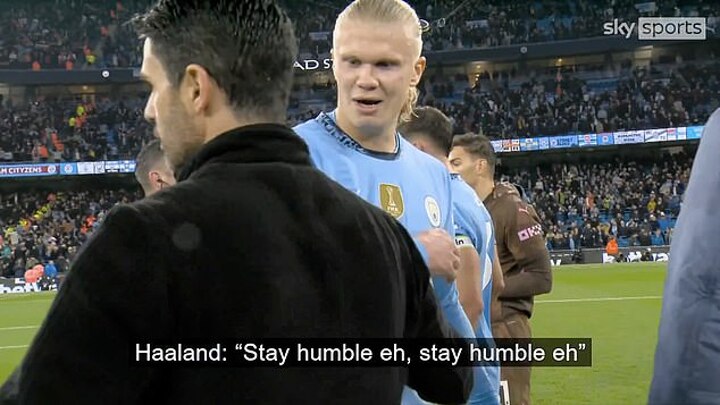“Stay modest, okay.” Those were the words of Erling Haaland to Arsenal boss Mikel Arteta as Manchester City had just scored a stoppage-time equalizer at the Etihad Stadium in September.
Haaland scored his tenth Premier League goal in five games earlier in the match and so was, unsurprisingly, feeling pretty good about himself.
But as my mother always said, pride comes before a fall and so after those words against Arteta, Haaland began his worst run of goals in a City shirt, three goals in his last ten games, a barren period. that also coincided with City's worst losing streak under Pep Guardiola.
Seven defeats in their last 10 in all competitions for Manchester City. That's not just bad for a manager like Guardiola, it's bad for any manager of a big club. The last time Arsenal lost seven in ten was in 1987 under George Graham. The last time Liverpool did that was in 1998 under Gerard Houllier. Even Tottenham haven't done it since 2004.
Now of course these things are connected. Haaland is Guardiola's leading man, his main source of goals and, in many ways, his talisman.
Take the Premier League: when Haaland scores, Man City usually wins, and almost never loses. They have only lost once when he has scored and that was against Brighton in November.
However, when Haaland starts but doesn't score, City fails to win more than half the time and lose almost a third of it.
This raises two questions. The first is why has he suddenly stopped scoring and secondly, if he isn't scoring, is he actually doing anything to help the team?
What's the point of Erling Haaland without his goals?
To answer the first, it is no coincidence that this drought has coincided with injuries to two of City's most influential stars: Rodri and Kevin De Bruyne.
Rodri suffered his season-ending injury in the match against Arsenal, while De Bruyne was ruled out ahead of the match and made only his first league start since the match against Nottingham Forest earlier this month.
Without them at the heart of City's game, Haaland has no more chances.
In this 10-game barren run, he is getting fewer 'big chances', a chance that statisticians say he should score, than ever before and a lower number of expected goals (xG) per goal. In everyday parlance, Haaland's teammates are not creating the clear-cut chances for him that they used to
Through the first five games of the season, De Bruyne played the most passes into the penalty area for City, with 60, an average of 15 per 90 minutes. Of the last ten games it is Phil Foden who has played the most, but only 49 times, with a rating of 7.8 per game, almost half as regularly.
Since Haaland's time at City, no midfielder has made more passes in the final third than Rodri.
Guardiola's side move the ball more slowly and with less intent without them, and it gives the opposition defense time to double down on Haaland and starve him in dangerous areas.
Take these two examples against Fulham and Nottingham Forest. City won both games but Haaland, so often pushed aside, barely had a sniff.
This brings us to the second question: if he doesn't score, what does he contribute? Well, the absence of Rodri and De Bruyne during this run has seen Haaland drop much deeper.
He's actually touched the ball more in this poor run and gotten more passes… just fewer in the attacking third and even fewer in the penalty area, where it matters.
You can see on his court cards how low he drops. Haaland takes the ball and plays passes into that dangerous central area, thirty yards away, where the likes of De Bruyne and Foden often thrive.
He has also been more creative. He's also rolled up his sleeves and done the dirty work.
In the first five games, when the goals were flying in, he created just a single chance for his teammates and regained possession twice. In the last ten games, when not, he has created ten chances and also won the ball back ten times.
So yeah, he's just not contributing in the way that best suits him or Guardiola.
The main problem, however, is that although he is given fewer opportunities, he does not take advantage of them when they do come his way.
In the first drawn matches he had ten big chances and scored seven of them. Ten goals from 26 shots with a conversion rate of 38.5%. That's insanely good, bordering on unsustainable.
However, in the last ten games he has converted three of his thirteen big chances. Three goals from 43 shots with a conversion rate of seven percent. That is terribly bad and also borders on the untenable for a player of Haaland's quality.
That's lower than all but three of 25 other players who attempted at least 20 shots in that time.
There are many reasons for City's slump. Including that Guardiola misses Rodri, De Bruyne misses and Haaland misses opportunities. No wonder they are having a hard time.
The ray of hope for Guardiola is that Haaland will not continue to miss them. He's way too good to do that.
When he finds his range again, things will look better.
